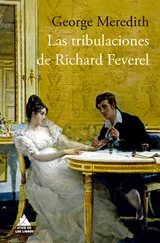George Meredith - The Ordeal of Richard Feverel. Complete
Здесь есть возможность читать онлайн «George Meredith - The Ordeal of Richard Feverel. Complete» — ознакомительный отрывок электронной книги совершенно бесплатно, а после прочтения отрывка купить полную версию. В некоторых случаях можно слушать аудио, скачать через торрент в формате fb2 и присутствует краткое содержание. Жанр: foreign_prose, literature_19, foreign_antique, на английском языке. Описание произведения, (предисловие) а так же отзывы посетителей доступны на портале библиотеки ЛибКат.
- Название:The Ordeal of Richard Feverel. Complete
- Автор:
- Жанр:
- Год:неизвестен
- ISBN:нет данных
- Рейтинг книги:4 / 5. Голосов: 1
-
Избранное:Добавить в избранное
- Отзывы:
-
Ваша оценка:
- 80
- 1
- 2
- 3
- 4
- 5
The Ordeal of Richard Feverel. Complete: краткое содержание, описание и аннотация
Предлагаем к чтению аннотацию, описание, краткое содержание или предисловие (зависит от того, что написал сам автор книги «The Ordeal of Richard Feverel. Complete»). Если вы не нашли необходимую информацию о книге — напишите в комментариях, мы постараемся отыскать её.
The Ordeal of Richard Feverel. Complete — читать онлайн ознакомительный отрывок
Ниже представлен текст книги, разбитый по страницам. Система сохранения места последней прочитанной страницы, позволяет с удобством читать онлайн бесплатно книгу «The Ordeal of Richard Feverel. Complete», без необходимости каждый раз заново искать на чём Вы остановились. Поставьте закладку, и сможете в любой момент перейти на страницу, на которой закончили чтение.
Интервал:
Закладка:
Prince Ferdinand was also fair. In his slim boating-attire his figure looked heroic. His hair, rising from the parting to the right of his forehead, in what his admiring Lady Blandish called his plume, fell away slanting silkily to the temples across the nearly imperceptible upward curve of his brows there—felt more than seen, so slight it was—and gave to his profile a bold beauty, to which his bashful, breathless air was a flattering charm. An arrow drawn to the head, capable of flying fast and far with her! He leaned a little forward, drinking her in with all his eyes, and young Love has a thousand. Then truly the System triumphed, just ere it was to fall; and could Sir Austin have been content to draw the arrow to the head, and let it fly, when it would fly, he might have pointed to his son again, and said to the world, “Match him!” Such keen bliss as the youth had in the sight of her, an innocent youth alone has powers of soul in him to experience.
“O Women!” says The Pilgrim’s Scrip, in one of its solitary outbursts, “Women, who like, and will have for hero, a rake! how soon are you not to learn that you have taken bankrupts to your bosoms, and that the putrescent gold that attracted you is the slime of the Lake of Sin!”
If these two were Ferdinand and Miranda, Sir Austin was not Prospero, and was not present, or their fates might have been different.
So they stood a moment, changing eyes, and then Miranda spoke, and they came down to earth, feeling no less in heaven.
She spoke to thank him for his aid. She used quite common simple words; and used them, no doubt, to express a common simple meaning: but to him she was uttering magic, casting spells, and the effect they had on him was manifested in the incoherence of his replies, which were too foolish to be chronicled.
The couple were again mute. Suddenly Miranda, with an exclamation of anguish, and innumerable lights and shadows playing over her lovely face, clapped her hands, crying aloud, “My book! my book!” and ran to the bank.
Prince Ferdinand was at her side. “What have you lost?” he said.
“My book!” she answered, her delicious curls swinging across her shoulders to the stream. Then turning to him, “Oh, no, no! let me entreat you not to,” she said; “I do not so very much mind losing it.” And in her eagerness to restrain him she unconsciously laid her gentle hand upon his arm, and took the force of motion out of him.
“Indeed, I do not really care for the silly book,” she continued, withdrawing her hand quickly, and reddening. “Pray, do not!”
The young gentleman had kicked off his shoes. No sooner was the spell of contact broken than he jumped in. The water was still troubled and discoloured by his introductory adventure, and, though he ducked his head with the spirit of a dabchick, the book was missing. A scrap of paper floating from the bramble just above the water, and looking as if fire had caught its edges and it had flown from one adverse element to the other, was all he could lay hold of; and he returned to land disconsolately, to hear Miranda’s murmured mixing of thanks and pretty expostulations.
“Let me try again,” he said.
“No, indeed!” she replied, and used the awful threat: “I will run away if you do,” which effectually restrained him.
Her eye fell on the fire-stained scrap of paper, and brightened, as she cried, “There, there! you have what I want. It is that. I do not care for the book. No, please! You are not to look at it. Give it me.”
Before her playfully imperative injunction was fairly spoken, Richard had glanced at the document and discovered a Griffin between two Wheatsheaves: his crest in silver: and below—O wonderment immense! his own handwriting!
He handed it to her. She took it, and put it in her bosom.
Who would have thought, that, where all else perished, Odes, Idyls, Lines, Stanzas, this one Sonnet to the stars should be miraculously reserved for such a starry fate—passing beatitude!
As they walked silently across the meadow, Richard strove to remember the hour and the mood of mind in which he had composed the notable production. The stars were invoked, as seeing and foreseeing all, to tell him where then his love reclined, and so forth; Hesper was complacent enough to do so, and described her in a couplet—
“Through sunset’s amber see me shining fair,
As her blue eyes shine through her golden hair.”
And surely no words could be more prophetic. Here were two blue eyes and golden hair; and by some strange chance, that appeared like the working of a divine finger, she had become the possessor of the prophecy, she that was to fulfil it! The youth was too charged with emotion to speak. Doubtless the damsel had less to think of, or had some trifling burden on her conscience, for she seemed to grow embarrassed. At last she drew up her chin to look at her companion under the nodding brim of her hat (and the action gave her a charmingly freakish air), crying, “But where are you going to? You are wet through. Let me thank you again; and, pray, leave me, and go home and change instantly.”
“Wet?” replied the magnetic muser, with a voice of tender interest; “not more than one foot, I hope. I will leave you while you dry your stockings in the sun.”
At this she could not withhold a shy laugh.
“Not I, but you. You would try to get that silly book for me, and you are dripping wet. Are you not very uncomfortable?”
In all sincerity he assured her that he was not.
“And you really do not feel that you are wet?”
He really did not: and it was a fact that he spoke truth.
She pursed her dewberry mouth in the most comical way, and her blue eyes lightened laughter out of the half-closed lids.
“I cannot help it,” she said, her mouth opening, and sounding harmonious bells of laughter in his ears. “Pardon me, won’t you?”
His face took the same soft smiling curves in admiration of her.
“Not to feel that you have been in the water, the very moment after!” she musically interjected, seeing she was excused.
“It’s true,” he said; and his own gravity then touched him to join a duet with her, which made them no longer feel strangers, and did the work of a month of intimacy. Better than sentiment, laughter opens the breast to love; opens the whole breast to his full quiver, instead of a corner here and there for a solitary arrow. Hail the occasion propitious, O British young! and laugh and treat love as an honest God, and dabble not with the sentimental rouge. These two laughed, and the souls of each cried out to other, “It is I it is I.”
They laughed and forgot the cause of their laughter, and the sun dried his light river clothing, and they strolled toward the blackbird’s copse, and stood near a stile in sight of the foam of the weir and the many-coloured rings of eddies streaming forth from it.
Richard’s boat, meanwhile, had contrived to shoot the weir, and was swinging, bottom upward, broadside with the current down the rapid backwater.
“Will you let it go?” said the damsel, eying it curiously.
“It can’t be stopped,” he replied, and could have added: “What do I care for it now!”
His old life was whirled away with it, dead, drowned. His new life was with her, alive, divine.
She flapped low the brim of her hat. “You must really not come any farther,” she softly said.
“And will you go, and not tell me who you are?” he asked, growing bold as the fears of losing her came across him. “And will you not tell me before you go”—his face burned—“how you came by that—that paper?”
She chose to select the easier question for answer: “You ought to know me; we have been introduced.” Sweet was her winning off-hand affability.
Читать дальшеИнтервал:
Закладка:
Похожие книги на «The Ordeal of Richard Feverel. Complete»
Представляем Вашему вниманию похожие книги на «The Ordeal of Richard Feverel. Complete» списком для выбора. Мы отобрали схожую по названию и смыслу литературу в надежде предоставить читателям больше вариантов отыскать новые, интересные, ещё непрочитанные произведения.
Обсуждение, отзывы о книге «The Ordeal of Richard Feverel. Complete» и просто собственные мнения читателей. Оставьте ваши комментарии, напишите, что Вы думаете о произведении, его смысле или главных героях. Укажите что конкретно понравилось, а что нет, и почему Вы так считаете.












